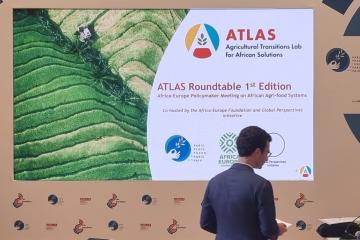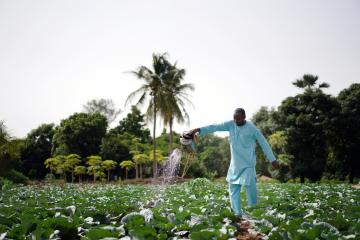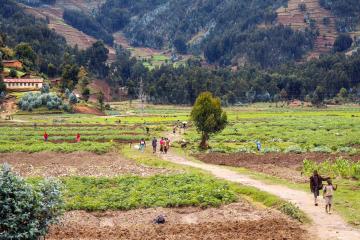
Building capacity for evidence-based agricultural programs in Africa

Despite Africa’s vast agricultural potential, smallholder farmers continue to face persistent barriers to productivity, including limited access to essential farming resources such as fertilizers and seeds, financial services, and places to buy and sell their goods. While programs to help farmers overcome these barriers are widely implemented across the continent, rigorous impact evaluation remains underutilized in assessing their effectiveness. Without strong data and evidence, decision-makers risk scaling programs that may not work as intended and potentially overlook cost-effective, high-impact solutions.
Recognizing this gap, The UM6P-J-PAL Agricultural Lab for Africa (UJALA) hosted its Custom Training Program in Rabat, Morocco from January 20–22, 2025, in collaboration with J-PAL Global. The training brought together 37 participants from thirteen countries, including OCP Africa staff implementing smallholder farming interventions across ten African nations, to develop the skills needed to evaluate their programs. Through interactive sessions on theory of change, randomization methods, and real-world case studies, participants explored how evidence-based decision-making can enhance the design and impact of farmer-centric initiatives.
This blog post examines key takeaways from the training, the broader significance of impact evaluation in agricultural programs, and how strengthening evaluation capacity can contribute to more effective programs and policies in African agriculture.
Addressing a gap: Why rigorous evaluation matters for agricultural programs
One major challenge is the widespread reliance on observational data and anecdotal assessments, which can often misrepresent causal relationships. For example, a government program that distributes subsidized fertilizer may observe higher yields among participating farmers, but without a rigorous evaluation, it is hard to determine whether the fertilizer itself caused the increase.
This is where impact evaluation, and particularly randomized evaluations, play a crucial role. By randomly assigning who receives an intervention and comparing outcomes with those who do not, randomized evaluations help isolate the actual impact of a program—ensuring that policy decisions are guided by robust, credible evidence.
For OCP Africa and its partners, who work across multiple countries designing interventions for smallholder farmers, developing evaluation capacity is critical. Their programs, which range from soil health initiatives and ensuring farming supplies reach rural communities to helping farmers access credit and connect with buyers, have the potential to transform agricultural livelihoods, and even more so if they are designed, tested, and refined based on solid evidence. The UJALA Custom Training Program aimed to bridge this gap by fostering a culture of evidence-based evaluation. The training sought to ensure that OCP Africa and its partners on the ground are not just implementing agricultural programs, but continuously learning from them.
What participants learned
The UJALA Custom Training Program sought to introduce evaluation concepts and help practitioners apply these concepts to real-world agricultural challenges. A key first step is clearly defining how an intervention is expected to create impact. Participants learned to construct a theory of change for their own programs: identifying the assumptions that need to hold for the intervention to succeed. The training emphasized that without a well-defined theory of change, even well-designed evaluations can fail to produce useful insights. For example, in group discussions on climate insurance for farmers, participants considered what behavioral or financial barriers might prevent uptake and how interventions might be adjusted to improve effectiveness.
Some agricultural programs can report positive results, but without rigorous evaluation, it is often unclear whether those results are due to the intervention itself or other external factors. Participants examined how randomization allows for robust causal inference by ensuring that those receiving an intervention and those not receiving it are comparable. Case studies helped demonstrate how randomized evaluations have helped refine agricultural programs in Africa, including efforts to increase fertilizer adoption in Kenya. Discussions covered ethical considerations and practical constraints when implementing randomization in field settings. By the end of the training, participants understood when and how to randomize agricultural interventions to measure a program’s true impact.
Beyond designing evaluations, the training also tackled common challenges in field research, such as choosing the right sample size to detect meaningful effects without excessive costs, addressing threats to validity including spillover effects and selection bias, and balancing rigorous evaluation with operational feasibility to ensure that study designs remain practical.
The insights gained from this training reinforced a mindset of continuous learning and adaptation, ensuring that agricultural programs evolve based on data, not just intuition.
How these lessons can be applied
The value of impact evaluation in agriculture goes beyond academic research. It directly influences how policies and programs are designed, implemented, and scaled. The training highlighted ways in which evaluation tools can lead to more effective farmer-support interventions, ensuring that resources are invested in approaches that genuinely improve smallholder livelihoods.
For example, governments and organizations across Africa invest heavily in resource subsidy programs, but there is mixed evidence on their long-term impact. The training emphasized how evaluation can help answer critical questions such as whether subsidies lead to sustained adoption of improved resources, how they can be designed to target the farmers who will benefit most, and what complementary interventions—such as training or access to credit—enhance their effectiveness. By applying evaluation tools, agricultural agencies can fine-tune subsidy structures, ensuring that they promote lasting behavioral change rather than short-term gains.
Many programs rely on farmer training and advisory services, where experts provide farmers with guidance on best practices, to promote improved practices, but their impact also varies widely across contexts. The training encouraged participants to consider what information actually changes farmer behavior, how advisory services can be designed for wider reach adoption, and how to measure whether knowledge leads to real productivity gains. For organizations like OCP Africa, which provides agronomic guidance alongside fertilizer distribution, these insights can inform better outreach strategies and content customization.
One of the most main takeaways from the training was the need to embed evidence-based thinking into institutional decision-making. Instead of relying on assumptions or external studies, organizations would benefit from regularly testing their own programs. Investing in internal capacity can help staff interpret and apply evaluation findings effectively and foster collaboration between researchers and implementers to ensure that agricultural policies are grounded in real-world evidence.
Looking ahead
The UJALA Custom Training Program provided an important introduction to impact evaluation in agriculture, but it is only the beginning of a broader effort to build a culture of evidence-based decision-making in African agricultural development. Strengthening evaluation capacity at scale will require ongoing investment in training, mentorship, and research collaborations.
The UJALA partnership between Mohammed VI Polytechnic University and J-PAL will continue to expand training opportunities and research collaborations, working to ensure that agricultural programs across Africa are also rigorously tested and continuously improved.
Interested in finding out more about UJALA and collaborating with us? Visit our web page to learn more and get in touch with the team.
Related Content

Mobilizing agricultural development in Africa: J-PAL joins the Paris Peace Forum Coalition

Using insurance and climate-smart technologies to help farmers cope with weather-based risk

